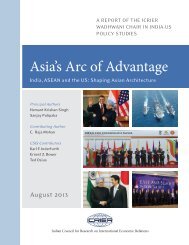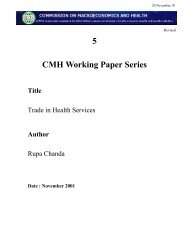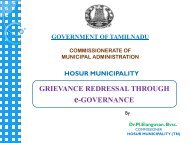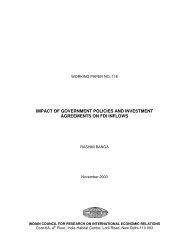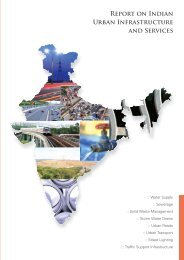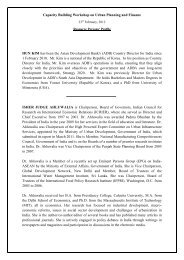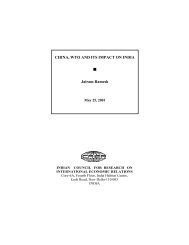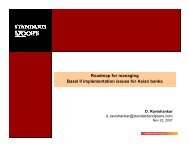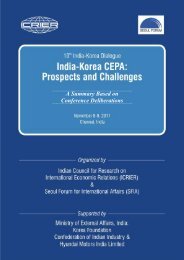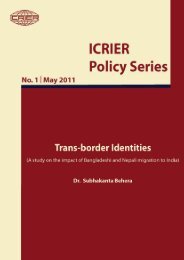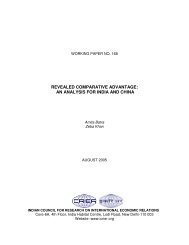Export Processing zones in India
Export Processing zones in India
Export Processing zones in India
You also want an ePaper? Increase the reach of your titles
YUMPU automatically turns print PDFs into web optimized ePapers that Google loves.
Commissioners’ (DC) offices <strong>in</strong> all the <strong>zones</strong> to gather <strong>in</strong>formation on what facilities they are<br />
provid<strong>in</strong>g to zone units. In what follows, we analyse the data generated by these surveys to<br />
evaluate the <strong>in</strong>vestment climate <strong>in</strong> the <strong>zones</strong>.<br />
V.1 Fiscal Incentives<br />
Sometimes it is argued that companies are not attracted by <strong>in</strong>centives per se and that good<br />
<strong>in</strong>frastructure and cheap labour availability are important ( ICIR, 1992). To revisit the issue, we<br />
asked the sampled firms : ‘how important it is to offer fiscal <strong>in</strong>centives for attract<strong>in</strong>g <strong>in</strong>vestment<br />
<strong>in</strong> the <strong>zones</strong>?’. Table 8 summarises the f<strong>in</strong>d<strong>in</strong>gs of the survey. Results of our surveys, contrary<br />
to the expectations, show that fiscal <strong>in</strong>centives are considered very important <strong>in</strong> determ<strong>in</strong><strong>in</strong>g the<br />
attractiveness of the <strong>zones</strong>. Over 85 percent of the respondents regarded them very important.<br />
Over 63% of the respondents found subsidies also very important <strong>in</strong> attract<strong>in</strong>g <strong>in</strong>vestment <strong>in</strong> the<br />
<strong>zones</strong>.<br />
Table 8 : Evaluation of the importance of fiscal <strong>in</strong>centives (% respondents)<br />
Less important Important Very Important<br />
Tax <strong>in</strong>centive 5.45 9.41 85.15<br />
Subsidies 23.16 13.68 63.16<br />
Source : calculated from the primary survey<br />
There has been considerable research on the impact of <strong>in</strong>centives on FDI decisions. The<br />
extent to which foreign <strong>in</strong>vestors respond to any aspect of <strong>in</strong>vestment climate may be used as a<br />
crude measure of its importance <strong>in</strong> determ<strong>in</strong><strong>in</strong>g <strong>in</strong>vestment climate. Therefore, it is not<br />
<strong>in</strong>appropriate to review this literature here. Earlier literature on the impact of tax <strong>in</strong>centives on<br />
FDI was <strong>in</strong>conclusive and did not rank them high among the ma<strong>in</strong> FDI determ<strong>in</strong>ants (UNCTAD<br />
1998). Recent literature however <strong>in</strong>dicates that the importance of corporate tax <strong>in</strong>centives has<br />
been <strong>in</strong>creas<strong>in</strong>g <strong>in</strong> attract<strong>in</strong>g FDI. The renewed debate on the effectiveness of tax <strong>in</strong>centives on<br />
FDI suggests that changes <strong>in</strong> the way mult<strong>in</strong>ational firms structure their operations abroad have<br />
made low tax rates <strong>in</strong>creas<strong>in</strong>gly important to a country's ability to attract foreign capital. Desai et<br />
al. (2002) assert that earlier US firms were us<strong>in</strong>g the host country tax assessment as a credit to<br />
reduce what would be a U.S. tax liability. Therefore, tax <strong>in</strong>centives offered <strong>in</strong> the host countries<br />
were not important for them. But now, mult<strong>in</strong>ational firms of the US and other countries with<br />
22




